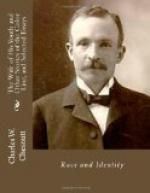“I admit my inferiority,” he replied. “If you are happy I am glad.”
“Clara Stafford,” mused the girl. “It is a pretty name.”
“You will never have to use it,” her lover declared, “for now you will take mine.”
“Then I shall have nothing left of all that I have found”——
“Except your husband,” asserted Dr. Winthrop, putting his arm around her, with an air of assured possession.
Mrs. Harper was looking at them with moistened eyes in which joy and sorrow, love and gratitude, were strangely blended. Clara put out her hand to her impulsively.
“And my mammy,” she cried, “my dear Virginia mammy.”
The Sheriffs Children
Branson County, North Carolina, is in a sequestered district of one of the staidest and most conservative States of the Union. Society in Branson County is almost primitive in its simplicity. Most of the white people own the farms they till, and even before the war there were no very wealthy families to force their neighbors, by comparison, into the category of “poor whites.”
To Branson County, as to most rural communities in the South, the war is the one historical event that overshadows all others. It is the era from which all local chronicles are dated,—births, deaths, marriages, storms, freshets. No description of the life of any Southern community would be perfect that failed to emphasize the all pervading influence of the great conflict.
Yet the fierce tide of war that had rushed through the cities and along the great highways of the country had comparatively speaking but slightly disturbed the sluggish current of life in this region, remote from railroads and navigable streams. To the north in Virginia, to the west in Tennessee, and all along the seaboard the war had raged; but the thunder of its cannon had not disturbed the echoes of Branson County, where the loudest sounds heard were the crack of some hunter’s rifle, the baying of some deep-mouthed hound, or the yodel of some tuneful negro on his way through the pine forest. To the east, Sherman’s army had passed on its march to the sea; but no straggling band of “bummers” had penetrated the confines of Branson County. The war, it is true, had robbed the county of the flower of its young manhood; but the burden of taxation, the doubt and uncertainty of the conflict, and the sting of ultimate defeat, had been borne by the people with an apathy that robbed misfortune of half its sharpness.
The nearest approach to town life afforded by Branson County is found in the little village of Troy, the county seat, a hamlet with a population of four or five hundred.




